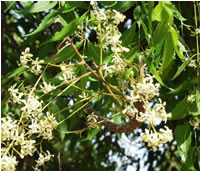 |
Flowering
neem |
Also known as Ugadi, a name derived from the Sanskrit Yug-adi, “beginning of an era”, Varsha-Pratipada* is the first day of Chaitra, the first month of the Hindu lunar year.
The exact moment the New Year begins is based on calculations found in the Hindu almanac, the panchanga.** The most important ritual of the festival, Panchanga Shravanam—“hearing of the panchanga”—traditionally was performed at a temple or village square. However in modern times priest-scholars have used the medium of television to disseminate predictions concerning upcoming highlights of the year.
Other rituals include taking a special bath, offering prayers and eating ugadi pacchadi, a special pickle made of six ingredients (typically jaggery, salt, neem flowers, tamarind, mango and chilli powder) said to symbolise the whole spectrum of life experience. Worshippers also donate kumbha—vessels containing specially prepared coconuts—and new clothes to the local guru or temple.
Before reading out the annual forecasts predicted by the panchanga, the priest reminds the congregation that the festival commemorates the day that the god Brahma created the present world. Symbolising the end of an old era and the beginning of a new, Ugadi is thus considered a highly auspicious moment to begin any new venture, and in some areas of the country, literary events such as those featuring the work of upcoming poets are held.
*Sanskrit
Nava Varsha means ‘new year’. Pratipada is the name
given to the tithi—lunar day—following the new and
full moon in the Hindu
lunar calendar used to determine most of the Hindu festivals.
**Literally ‘five limbs’ (pancha, ‘five’
and anga, ‘limb’). The panchanga is used
to determine moments when the various permutations and combinations of
the five units of time are found congenial, and hence ‘auspicious’.
There are many regional panchangas used to determine the dates of local
festivals. But some specially published almanacs are used nationally to
set the days of government holidays.